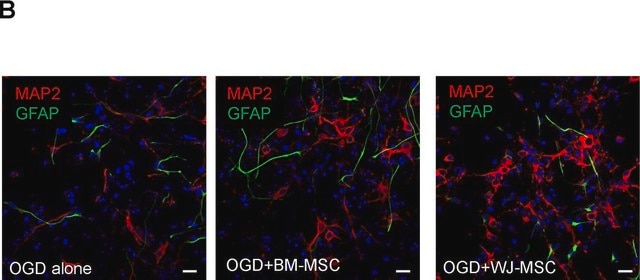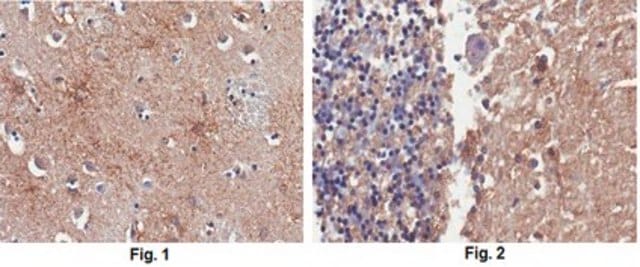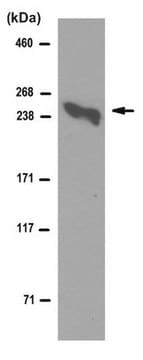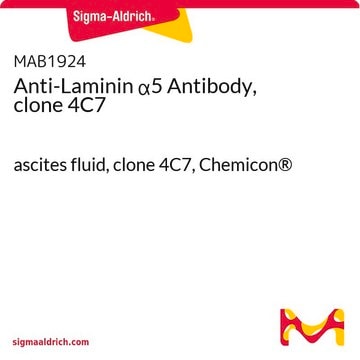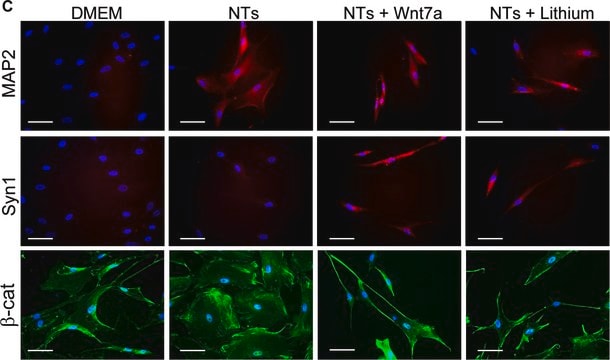MAB378
Anti-MAP2A Antibody, AP20
ascites fluid, clone AP20, Chemicon®
Synonym(s):
Microtubule Associated Protein 2
About This Item
Recommended Products
biological source
mouse
Quality Level
antibody form
ascites fluid
antibody product type
primary antibodies
clone
AP20, monoclonal
species reactivity
quail, bovine, human, mouse, amphibian, Xenopus, rat, avian
manufacturer/tradename
Chemicon®
technique(s)
immunohistochemistry: suitable
western blot: suitable
isotype
IgG1
NCBI accession no.
UniProt accession no.
shipped in
dry ice
target post-translational modification
unmodified
Gene Information
human ... MAP2(4133)
General description
MAP-2 is a stringent marker for neurons. In addition, MAP-2 displays intracellular specificity. In the central nervous system, MAP-2 is confined to neuronal cell bodies and dendrites. There are exceptions, however, where some axons stain positive for small amounts of MAP-2 (Caceres, 1984; Binder, 1986). MAP-2 is uniformly distributed throughout the cell when first expressed in cultured neurons but becomes selectively localized as dendritic development proceeds (Caceres, 1986; Dotti, 1987).
Specificity
Immunogen
Application
1:50-1:200. AP20 stains dendrites and neuron cells bodies but not neuronal processes and axons. A previous lot of this antibody was used in immunohistochemistry.
Western blot:
SDS-PAGE Profiles: In SDS-PAGE MAP-2 from adult rat migrates as a closely associated doublet having a molecular weight of approximately 300 kD. However, early in brain development (postnatal day 10 in rats), MAP-2 migrates as a single band that is identical to the lower molecular weight band of the adult MAP-2 doublet (MAP-AP20). Later in development (postnatal days 17-18), the mobility of MAP-2 changes to the adult doublet form. (In the spinal cord, conversion to the adult form occurs earlier).
Western blot: A 1:500 dilution was used in a previous lot.
Optimal working dilutions must be determined by end user.
Neuroscience
Neuronal & Glial Markers
Neurofilament & Neuron Metabolism
Quality
Western Blot Analysis:
1:500 dilution of this lot detected MAP 2 on 10 μg of PC12 lysates.
Target description
Linkage
Physical form
Storage and Stability
Handling Recommendations: Upon receipt, and prior to removing the cap, centrifuge the vial and gently mix the solution. Aliquot into microcentrifuge tubes and store at -20°C. Avoid repeated freeze/thaw cycles, which may damage IgG and affect product performance. Note: Variability in freezer temperatures below -20°C may cause glycerol containing solutions to become frozen during storage.
Analysis Note
Brain tissue
Cultured neurons
Other Notes
Legal Information
Disclaimer
Not finding the right product?
Try our Product Selector Tool.
recommended
Storage Class Code
12 - Non Combustible Liquids
WGK
nwg
Flash Point(F)
Not applicable
Flash Point(C)
Not applicable
Certificates of Analysis (COA)
Search for Certificates of Analysis (COA) by entering the products Lot/Batch Number. Lot and Batch Numbers can be found on a product’s label following the words ‘Lot’ or ‘Batch’.
Already Own This Product?
Find documentation for the products that you have recently purchased in the Document Library.
Our team of scientists has experience in all areas of research including Life Science, Material Science, Chemical Synthesis, Chromatography, Analytical and many others.
Contact Technical Service